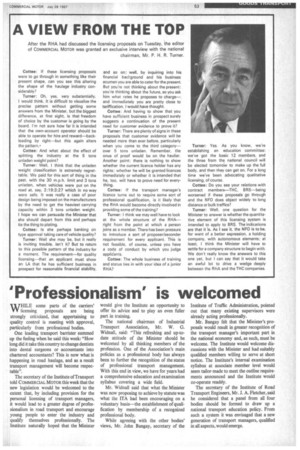A VIEW FROM THE TOP After the RHA had discussed
Page 55

If you've noticed an error in this article please click here to report it so we can fix it.
the licensing proposals on Tuesday, the editor of COMMERCIAL MOTOR was granted an exclusive interview with the national
chairman, Mr. P. H. R. Turner.
Cottee: If these licensing proposals were to go through in something like their present shape, can you see this altering the shape of the haulage industry considerably?
Turner: Oh, yes, very substantially, I would think. It is difficult to visualize the precise pattern without getting some answers from the Minister, but the biggest difference, at first sight, is that freedom of choice by the customer is going by the board. I'm not sure how far it is intended that the own-account operator should be able to operate for hire and reward—backloading by right—but this again alters the pattern.
Cottee: And what about the effect of splitting the industry at the 5 tons unladen weig hfpoint?
Turner: Well, I think that the unladen weight classification is extremely regrettable. We paid for this sort of thing in the past, with the 30 m.p.h. limit and 3 tons unladen, when vehicles were put on the road at, say, 2:19:3:27 which in no way were safe. It was really a case of poor design being imposed on the manufacturers by the need to get the heaviest carrying capacity within 3 tons unladen weight. I hope we can persuade the Minister that she should depart from this and perhaps tie the thing to plating.
Cottee: Is she perhaps banking on type approval taking care of vehicle quality?
Turner: Well she may be, but it really is inviting trouble, isn't it? But to return to this possible pattern of the industry for a moment. The requirement—for quality licensing—that an applicant must show an LA that he has sufficient business in prospect for reasonable financial stability,
and so on; well, by inquiring into his financial background and his business acumen you are able to cater for the present. But you're not thinking about the present: you're thinking about the future, so you ask him what rates he proposes to charge— and immediately you are pretty close to tariffication, I would have thought.
Cottee: And having to show that you have sufficient business in prospect surely suggests a continuation of the present need for customer evidence to prove it?
Turner: There are plenty of signs in these proposals that customer evidence will be needed more than ever before, particularly when you come to the third category— over 5 tons unladen. Remember, the onus of proof would be on the haulier. Another point: there is nothing to show whether the current licence holder has any rights; whether he will be granted licences immediately or whether it is intended that he, too, wit have to prove need for everything.
Cottee: If the transport manager's licence turns out to require some sort of professional qualification, is it likely that the RHA would become directly involved in providing some of the training?
Turner: I think we may well have to look at the whole structure of the RHAright from the point at which a person joins as a member. There has been pressure to introduce a sort of proposer/seconder requirement for every applicant. This is not feasible, of course, unless you have a code of conduct by which you judge appli dents.
Coffee: The whole business of training and status ties in with your idea of a junior RHA?
Turner: Yes. As you know, we're establishing an education committee: we've got the basic 12 members, and the three from the national council will be elected tornorro`w to make up the full body, and then they can get on. For a long time we've been advocating qualitative licensing, of course.
Cottee: Do you see your relations with contract members—THC, BRS—being worsened if these proposals go through and the NFO does object widely to long distance or bulk traffics?
Turner: Well, one question for the Minister to answer is whether the quantitative element of this licensing system is intended to apply to BM The indications are that it is. As I see it, the NFO is to be, for want of a better expression, a holding company, with autonomous elements: at least, I think the Minister will have to settle for a company structure to begin with. We don't really know the answers to this one yet, but I can say that it would take an awful lot to drive a wedge deeply between the RHA and the THC companies.




































































































































































